Cite this document
(The Role of Virtu for Machiavellis Ideal Prince Book Report/Review, n.d.)
The Role of Virtu for Machiavellis Ideal Prince Book Report/Review. Retrieved from https://studentshare.org/politics/1711154-explain-the-role-of-virtu-for-machiavellis-ideal-prince
The Role of Virtu for Machiavellis Ideal Prince Book Report/Review. Retrieved from https://studentshare.org/politics/1711154-explain-the-role-of-virtu-for-machiavellis-ideal-prince
(The Role of Virtu for Machiavellis Ideal Prince Book Report/Review)
The Role of Virtu for Machiavellis Ideal Prince Book Report/Review. https://studentshare.org/politics/1711154-explain-the-role-of-virtu-for-machiavellis-ideal-prince.
The Role of Virtu for Machiavellis Ideal Prince Book Report/Review. https://studentshare.org/politics/1711154-explain-the-role-of-virtu-for-machiavellis-ideal-prince.
“The Role of Virtu for Machiavellis Ideal Prince Book Report/Review”, n.d. https://studentshare.org/politics/1711154-explain-the-role-of-virtu-for-machiavellis-ideal-prince.


